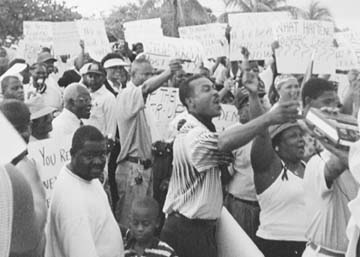


|
|
Militant/Mary Ann Schmidt
|
|
Rally in Miami of June 12 demanding justice for Marc Dorvil, killed by the police.
|
Protest signs filled the air demanding: "Justice for Marc Dorvil!" "Stop the Cover-up," "Justice for Blacks," "Stop Police Brutality/Stop Racial Profiling," "Jail Killer Cops," "We Demand a Federal Investigation," and "Remember Rodney King, Abner Louima, Amadou Diallo."
"People think the police killed Marc Dorvil. That’s why I’m here today. I believe the police of this city are hiding the truth," said Yvon Jacques.
Dorvil was involved in a minor car accident on the causeway May 14. The police claim when they approached him, he acted "strange" and it took up to eight cops to "subdue" him. Dorvil was hog-tied and placed face down in the back of the patrol car. According to the Miami Herald, "He kicked the door" of the patrol car and "banged his head against the window." An ambulance was called to treat the police, but Dorvil was left untreated in the back of the police car. The cops took him to Jackson Memorial Hospital, where he was pronounced dead.
Initial press accounts of Dorvil acting like a person in a "cocaine fit" were amended when the medical examiners ruled out any presence of drugs in his system. The examiners also rejected any blame of the police. The allegation of drug use outraged working people in the community.
A flyer passed out by the Coalition Against Police Brutality and Brothers of the Same Mind reported that the State Attorney’s "summary of events" claims Dorvil broke out of flex cuffs three times. A force of 400 pounds is needed to do this, which would have caused bruising and scarring on Dorvil’s ankles, the flyer said. However the official autopsy found no evidence to support this claim. The flyer explained that this is part of the "animalization" of Dorvil by the cops and city authorities.
The official conclusion presented at a public meeting at the Miami-Dade medical examiner’s auditorium on May 25 was that Dorvil died of a "rare brain chemistry malady" that caused his behavior to resemble that of a violent reaction to cocaine. The county investigator concluded that he died of "acute exhaustive mania."
The Haitians and African Americans present at the meeting expressed skepticism. "I sense a cover-up here," Islande Salomon told the Miami Herald.
"Today is just the beginning. VeyeYo will go back to its base and plan future activities," stated Lavarice Gaudin of VeyeYo, the Haitian rights organization that initiated the march that was then embraced by other organizations. The list of sponsors included the American Civil Liberties Union, the Coalition Against Police Brutality, Brothers of the Same Mind, People United to Lead the Struggle for Equality, and others.
The majority of the protesters were Haitian, and most of them workers. A few women sported UNITE union T-shirts.
Dorvil worked 10-hour days as a carpenter and was a part-time minister. Some of the demonstrators were from his church. Marie Aurelus Bien-Aimee, a 33-year-old medical worker, expressed a common sentiment at the march. "We need justice for the death of Reverend Marc. I’ve known him for two years and I’ve never seen him act like that," she said.
There were also protesters from New York, including Abner Louima, the Haitian immigrant who was brutalized by New York City cops in 1997. Lavarice Gaudin said, "Abner Louima called us when he heard about the case. He wanted to be a part of this, and he’s here with his brother." Louima addressed the rally at the end of the march.
Also present were family members of Patrick Dorismond, a 26-year-old Black youth gunned down by a plainclothes New York City cop after he rebuffed the policeman’s request to buy some marijuana from him in March 2000.
Jacqueline Thomas-Jean, a 72-year-old Haitian retired teacher, also came from New York for the event. "There is only one way to make your voice heard, to demonstrate, demonstrate again, and demonstrate more!" she said, "[Nelson] Mandela taught us this."
Two weeks before Dorvil’s death, Nicholas Singleton, a young Black man, was killed by the police April 30 in the nearby community of Overtown. Signs at the June 2 march called for "Justice for Singleton" and also commemorated other victims of police terror here over the years. The march swelled to 1,000 people as the overcast skies turned to a downpour. One woman shouted, "We don’t care about the rain, we want justice!" Under a canopy of umbrellas and sagging placards the protesters marched back to the park. The speakers program went on despite the rain, and was conducted mostly in Creole.
What happened to Marc Dorvil "always seems to happen to Black men,’’ said Leroy Jones, founder of Brothers of the Same Mind, an organization that fights for the rights of former prisoners. "What we really want is an independent investigation and autopsy."
Cindy Jaquith, Rebecca Arenson, and Eric Simpson contributed to this article.
Front page (for this issue) |
Home |
Text-version home